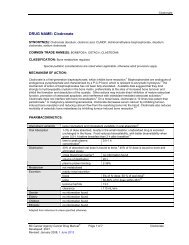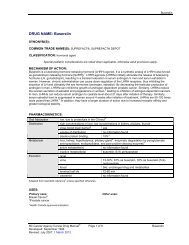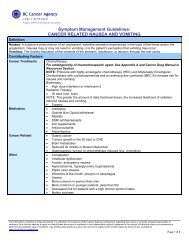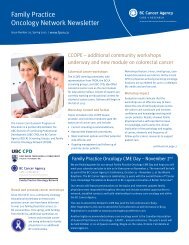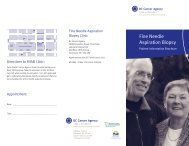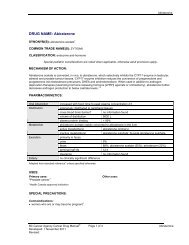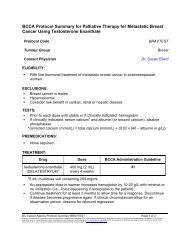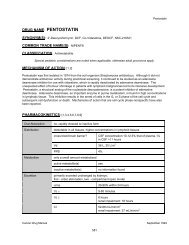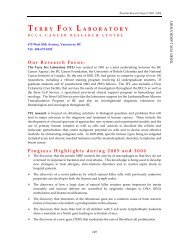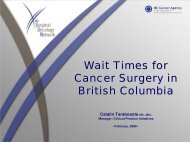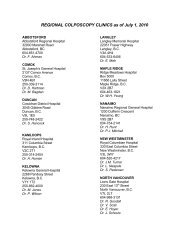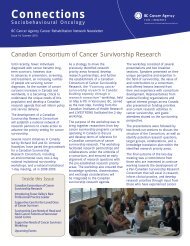New BC Cancer Research Centre - BC Cancer Agency
New BC Cancer Research Centre - BC Cancer Agency
New BC Cancer Research Centre - BC Cancer Agency
Create successful ePaper yourself
Turn your PDF publications into a flip-book with our unique Google optimized e-Paper software.
C A N C E R C A R E A N D R E S E A R C HWHAT’S INSIDE:ISSUE NO. 7SPRING 2004• <strong>New</strong> <strong>BC</strong> <strong>Cancer</strong> <strong>Research</strong> <strong>Centre</strong>– impacting lives throughout <strong>BC</strong>• Prevention initiatives• Prostate brachytherapycomes to Southern Interior• Latest research news
I N F O C U S<strong>New</strong> <strong>BC</strong> <strong>Cancer</strong> <strong>Research</strong> <strong>Centre</strong>on target for completion late 2004Five years ago a new state-of-the art <strong>BC</strong> <strong>Cancer</strong><strong>Research</strong> <strong>Centre</strong> still seemed like a dream. <strong>BC</strong><strong>Cancer</strong> <strong>Agency</strong> researchers were working in crampedquarters in an old converted bakery, yet wererenowned worldwide for innovative cancer research.But the time had come to create a leading edgefacility that would continue to attract top scientistsfrom around the world. People like B.C.'s NobelLaureate, the late Dr. Michael Smith, whose dreamit was to create a leading genomics research facility,Dr. Victor Ling, vice-president of research for the<strong>BC</strong> <strong>Cancer</strong> <strong>Agency</strong>, and Dr. Marco Marra, head of the<strong>BC</strong> <strong>Cancer</strong> <strong>Agency</strong>'s Genome Sciences <strong>Centre</strong>. The<strong>BC</strong> <strong>Cancer</strong> Foundation undertook the task of raisingthe money to build the new centre. The dream is nowrapidly becoming reality, with the 14-story <strong>BC</strong> <strong>Cancer</strong><strong>Research</strong> <strong>Centre</strong> building nearing completion, at thecorner of West 10th Avenue and Heather Street inVancouver.Funds are needed to complete and equip thecentre. "It is vital that British Columbians know justhow critical their contributions are to the success ofthis project," says Mary McNeil,president and CEO of the <strong>BC</strong> <strong>Cancer</strong>Foundation, which both owns andfunds the <strong>BC</strong> <strong>Cancer</strong> <strong>Research</strong><strong>Centre</strong> building. "This willtruly be a distinctivebuilding, that will makea difference in the lives ofpeople everywhere in B.C.,and beyond."Dr. Simon Sutcliffe, president of the <strong>BC</strong> <strong>Cancer</strong><strong>Agency</strong> says, "It is exciting to see it becoming 'real'before our eyes. That drives us to re-think what wasa promise of what we could be, to actually what arewe going to be when we expand into this newfacility."Dr. Ling adds, "This new building will providecritically needed research space and allow us tocontinue to attract the brightest and the bestresearchers to help us tackle the cancer problem.""THE BUILDING MUST BE THEIMPETUS TO REALIGN OURDIRECTION TO HOW RESEARCHAND KNOWLEDGE ACTUALLYTRANSLATE INTO CHANGING OUT-COMES FOR CANCER PATIENTS."—DR. SIMON SUTCLIFFE,PRESIDENT, <strong>BC</strong> CANCER AGENCYFunding for the new centre came from a varietyof sources, he explains. "We are very grateful to<strong>BC</strong> <strong>Cancer</strong> Foundation donors, as well as to theKnowledge Development Fund of <strong>BC</strong>, and the CanadaFoundation for Innovation (CFI). An internationalreview committee judged this as a truly outstandingproposal when we applied. At the time, it was thelargest grant CFI gave to any organization and stillranks amongst the top awards." He adds, "The newbuilding is a constant reminder and a concreteexample to me that if we work together - scientists,physicians, community, universities, and governmentswe can achieve far beyond what we could imagine."Cover photo (large): Keith Holoboff.Inset cover photos and photos on pages 1 & 2: Alfred Meikleham1
I N F O C U SA chance to be part ofthe future of cancer researchDr. Sutcliffe explains the importance of the newbuilding for patients. "We are increasing our capacityfor research. The building must be the impetus torealign our direction to how research and knowledgeactually translate into changing outcomes for cancerpatients."The clinicians and scientists who conduct theirresearch in this expanded, state of the art facilitywill impact cancer patients in B.C. and around theworld," says Dr. Sutcliffe, "particularly if we focusour thinking on innovation, rapid translation ofdiscovery to application on patients, and theresearch centre as a forum for collaboration andnetworking amongst scientists, clinicians andpractitioners."The kind of research made possible by the newfacility and the skilled people it will attract, as wellas the on-going research funding provided by donorsto the <strong>BC</strong> <strong>Cancer</strong> Foundation will bring us muchcloser to our vision of a world free from cancer.Critical funds are still needed to complete andequip the new <strong>BC</strong> <strong>Cancer</strong> <strong>Research</strong> <strong>Centre</strong>.For information please contact Nicholas Locke,vice-president development and strategic planning,<strong>BC</strong> <strong>Cancer</strong> Foundation at 604.707.5906 ornlocke@bccancer.bc.caRecognition opportunities at the new<strong>BC</strong> <strong>Cancer</strong> <strong>Research</strong> <strong>Centre</strong> BuildingThere are still a variety of opportunities for you torecognize your family or your business, as a dedicatedsupporter of world-leading research at the new <strong>BC</strong><strong>Cancer</strong> <strong>Research</strong> <strong>Centre</strong>. This highly-visible new centre,located at the corner of West 10th Avenue and HeatherStreet in Vancouver, across from the <strong>BC</strong> <strong>Cancer</strong> <strong>Agency</strong>'sVancouver <strong>Centre</strong> will be one of the most importantcancer research facilities in Canada and the world. Itwill be home to eight research departments, includingthe <strong>Agency</strong>'s Genome Sciences <strong>Centre</strong>, first in theworld to sequence the SARSvirus. Significant opportunities areavailable beginning at $100,000 forthe signature feature round windows;half a laboratory floor at $250,000;a full laboratory floor at $500,000;the Entrance Plaza, the DNA Staircaseand the Rooftop Presentation Roomeach at $1 million; and the Lobbyand Hall of Honour each at $1.5million. There is also an exceptionalopportunity to have the new<strong>BC</strong> <strong>Cancer</strong> <strong>Research</strong> <strong>Centre</strong> buildingnamed in your honour.To find out more please contactJanice Loomer Margolis, senior directorof major and planned gifts, <strong>BC</strong> <strong>Cancer</strong>Foundation at 604.877.6163 orjmargoli@bccancer.bc.ca."THE NEW BUILDING IS A CONSTANT REMINDERAND A CONCRETE EXAMPLE TO ME THATIF WE WORK TOGETHER - SCIENTISTS,PHYSICIANS, COMMUNITY, UNIVERSITIES, ANDGOVERNMENTS - WE CAN ACHIEVE FAR BEYONDWHAT WE COULD IMAGINE."—DR. VICTOR LING, VICE PRESIDENT,RESEARCH, <strong>BC</strong> CANCER AGENCY2
I N F O C U STaking control of cancer:<strong>BC</strong> <strong>Cancer</strong> <strong>Agency</strong>'s prevention programsIt's a startling statistic: 50 per cent of cancerscan be prevented, and largely through changesin lifestyle choices.Most people know what those choices are:maintain a healthy weight, limit exposure toUV rays, and don't smoke. The problem, however,is learning how to make those changes a reality.Educating the public and health care providersabout cancer prevention is an important part ofthe <strong>BC</strong> <strong>Cancer</strong> <strong>Agency</strong>'s cancer control strategy."The <strong>BC</strong> <strong>Cancer</strong> <strong>Agency</strong> is recognizing thecomplete spectrum of cancer care, from preventionto palliative care," explains Dr. David McLean, leaderof <strong>Cancer</strong> Prevention at the <strong>Agency</strong>. "As part of thisemphasis, programs are being developed with afocus on prevention."One of the most obviously preventable cancers islung cancer, whichis also the mostprevalent cancerMORE PEOPLE DIE FROM in British Columbia.More people dieLUNG CANCER IN B.C. EACH from lung cancer inB.C. each year thanYEAR THAN PROSTATE AND prostate and breastcancer combined.BREAST CANCER COMBINED. As health careprofessionals arein an excellentposition torecognize the effects of smoking on their patients,and to encourage new and positive behaviour,the <strong>BC</strong> <strong>Cancer</strong> <strong>Agency</strong> is enlisting their help.One of the keys is training health care professionalsto help their patients make informed choices. Inthe last year, the <strong>BC</strong> <strong>Cancer</strong> <strong>Agency</strong> has launched twonew programs to help doctors educate their patientsabout cancer prevention, particularly for skin andlung cancer.The Clinical Tobacco Intervention program providesfamily doctors with answers to patients' questionsabout advice and actions to help them quit smoking.Already, almost 300 physicians have either taken orare planning to take the course. To reach a greaternumber of the province's smokers, the program isgoing to be expanded for other health professionals,such as dentists, dental hygienists, pharmacists andradiation therapists.Other lifestyle changes beyond not smoking canhave an enormous impact on a person's ability toreduce their cancer risk. Skin cancer is one ofthe most easily preventable cancers - reduce sunexposure and you reduce your risk. The <strong>BC</strong> <strong>Cancer</strong><strong>Agency</strong> has not only launched a web course forphysicians to learn more about skin cancer, it isalso teaching children how to stay safe in the sunthrough a preschool education program.Currently, the <strong>BC</strong> <strong>Cancer</strong> <strong>Agency</strong> is looking at allof these factors as it develops a strategic plan forcancer prevention in this province. Working withorganizations such as the Canadian Strategy for<strong>Cancer</strong> Control and the Ministry of Health, Dr. McLeanhopes that by having a balanced approach to cancercare, the <strong>BC</strong> <strong>Cancer</strong> <strong>Agency</strong> can play an importantpart in reducing the public's risk of developing cancer."If we can prevent one half of those cancers whichare avoidable, we can have a significant impact onthe cancer rates in this province."To learn more about the <strong>BC</strong> <strong>Cancer</strong> <strong>Agency</strong>'s onlineContinuing Medical Education courses, please visit:www.bccancer.bc.ca/HPI/CME/default.htm.For more information about ‘Be Sun Safe,’ a cancerprevention program for children, please visit:www.bccancer.bc.ca/A<strong>BC</strong>CA/<strong>New</strong>s<strong>Centre</strong>/2003/SunSafe.htm.FIFTY PER CENT OF CANCERSCAN BE PREVENTED, AND LARGELYTHROUGH CHANGES INLIFESTYLE CHOICES.3
B R I G H T L I G H T SDr. Stephen Lam:Lung cancer specialist, physicianand researcher, <strong>BC</strong> <strong>Cancer</strong> <strong>Agency</strong>Inspiration:Dr. Shigeto Ikeda, National <strong>Cancer</strong> Institute, Tokyo, anengineer who became a thoracic surgeon and inventedthe fiberoptic bronchoscope. This inspired Dr. Lam’sinterest in technology and how it could be applied tocancer treatment and research.Dr. Lam pioneered the use of photodynamic therapy(PDT) for lung cancer patients in Canada. He and hisradiation oncology colleagues were the first in Canadato perform high-dose rate brachytherapy (insertionof radioactive seeds) for patients with lung cancerobstructing major bronchial tubes - a treatmentthat is easier on the patient than laser therapy.Dr. Lam worked in Japan with Dr. Ikeda whodeveloped the first fiberoptic bronchoscope, adevice that allows chest physicians to see far intothe bronchi of the lung and find where the cancer is.The bronchoscope is also used for treating lung cancer,to insert the catheter needed to place the radioactiveseeds used in brachytherapy.Fiberoptic bronchoscopy is usually done under alocal freezing to the throat, which is much easier on thepatient than the previous method of using a rigid metaltube. In the late 1980’s, Dr. Lam and his colleagues atthe <strong>BC</strong>CA <strong>Cancer</strong> Imaging Department developed fluorescencebronchoscopy, which uses natural fluorescencein bronchial tissue to detect early lung cancer. Thetechnology was transferred to a <strong>BC</strong>CA spin-off company.Autofluorescence bronchoscopy is now used clinically inover 120 medical centres worldwide. It is the world’sfirst clinical optical imaging device for cancer detection.<strong>Research</strong> specialties:• Clinical trials of natural health products as wellas prescription drugs on lung cancer prevention:Green Tea Study and ACAPHA study (a combinationof six herbs) given to former and heavy smokers,with pre-cancerous lesions• Early detection program - examination of sputumsamples coupled with spiral CT scan of the chestand fluorescence bronchoscopy of long-timesmokers to detect early lung cancer• Integrating clinical and various basic researchareas to provide a comprehensive approach toprevention, and early detection of lung cancerDr. Lam conducts his research out of the <strong>Cancer</strong>Imaging Laboratory at the <strong>BC</strong> <strong>Cancer</strong> <strong>Research</strong> <strong>Centre</strong>,where he collaborates closely with researchers in otherdepartments including the <strong>Cancer</strong> Genetics Departmentand Genome Sciences <strong>Centre</strong>.What Dr. Lam is most excited about“Our comprehensive lung cancer research program.Our strength is multi-disciplinary research and closecollaboration between clinicians. The <strong>BC</strong> <strong>Cancer</strong> <strong>Agency</strong>is a pioneer in integrating different basic research areaswith clinical areas into a comprehensive strategy, wherewe harness the usable data and research that we andothers are doing, and bring it all together. With thisapproach we expect to see prevention and reduction inthe incidence of lung cancer, as well as a better qualityof life and longer survival of patients with lung cancer."Results of researchIn the early detection program, lung cancers detectedat an early, pre-invasive or localized stage were curedby endobronchial therapy or surgery.Importance of <strong>BC</strong> <strong>Cancer</strong> Foundation funding"Critical. With major grants, some organizations requirewe demonstrate we have matching funds available beforewe can even apply. When we can show the <strong>BC</strong> <strong>Cancer</strong>Foundation is behind us, it gives us a much strongerchance of obtaining the grants we need. The Foundationalso provides crucial seed money to jump-start promisingprojects. Success of these large-scale and developmentalprojects will generate new, evidence-based knowledgeand allow us to apply the knowledge into our existing,province-wide, lung cancer control program to improvethe outcome of patients with lung cancer."4
R E S E A R C H N E W S<strong>New</strong> research halts cancer growthby stopping blood supply to tumoursBenefits of exercise for breast cancer patientssubject of new study5<strong>Research</strong>ers at the <strong>BC</strong> <strong>Cancer</strong> <strong>Agency</strong> have discovereda new way to halt the growth of some cancers byshutting down their blood supply.A new study suggests a method to deprive tumoursof important blood vessels. Most solid tumours rely ona blood supply to survive. So destroying existing bloodvessels to a tumour, and preventing the growth ofnew vessels - known as anti-angiogenesis - hasbeen the focus of intense investigation.However, to date, with the exception ofAvastin, most anti-angiogenesis drugshave failed in clinical trials.The team, led by <strong>BC</strong> <strong>Cancer</strong> <strong>Agency</strong>senior scientist Dr. Shoukat Dedhar andMD/PhD student Clara Tan, has now identified anew target for anti-angiogenic therapy. They havefound that by inhibiting the function of a protein calledIntegin-Linked Kinase (ILK), they could prevent theWhat type of exercise can best affect the quality oflife for breast cancer patients? It's a question the<strong>BC</strong> <strong>Cancer</strong> <strong>Agency</strong> and University of British Columbiaare trying to answer through a new study: SupervisedTrial of Aerobic vs Resistance Training (START).Recent research has begun to document howexercise can affect the quality of life for breast cancersurvivors receiving chemotherapy. What researchersdon't know is which typeof exercise might be mostbeneficial: aerobic orweight training."We are just beginning toresearch issues of what kindof exercise is possible, ofvalue, and appropriate forcancer patients," explainsDr. Karen Gelmon, a <strong>BC</strong><strong>Cancer</strong> <strong>Agency</strong> physicianand researcher. "We are alsointerested in knowing whatConnie Ratzlaff, (l) STARTparticipant gets workouttips from Diana Jesperson,the study co-ordinator, inthe new exercise facility.growth of blood vessels in human tumours transplanted inmice and significantly slow down the growth of the tumours.ILK plays an interesting dual role in the support of tumourgrowth. Dr. Dedhar and his colleagues have found that overactiveILK in tumour cells promotes the secretion of a factorcalled vascular endothelial growth factor (VEGF) which isrequired for the formation of new blood vessels. Thus, byinhibiting ILK function, VEGF production by the tumour cellsis blocked. What makes this study even more exciting is thatit shows that the function of ILK is also essential in endothelialcells, which are the building blocks of blood vessels,and are stimulated to grow and form new blood vessels inresponse to VEGF. The team found that inhibiting ILK functionin endothelial cells prevented the cells from growing andcoming together to form blood vessels in response to VEGF.Dr. Dedhar expects that within a year, the <strong>BC</strong> <strong>Cancer</strong><strong>Agency</strong> could begin clinical trials with breast and prostatecancer patients.exercise does to hormonal levels and what overallimpact exercise may have on the quality of life andcare of breast cancer patients."The START program is recruiting 70 patients in theLower Mainland over the next two years. Participantswill undergo a physical fitness assessment betweenthe first and second chemotherapy appointment.The study volunteers will be randomly assigned intothree groups: aerobic exercise, weight training, ordelayed exercise.For Connie Ratzlaff, currently a breast cancerpatient at the <strong>BC</strong> <strong>Cancer</strong> <strong>Agency</strong>, being acceptedinto the START program was something positive in anotherwise difficult time. Ratzlaff, a fitness instructor,was encouraged to take a break from teaching herregular classes when she was first diagnosed. TheSTART program offered her the chance to continueher exercise routine."I'm benefitting already, because exercise issomething that I look forward to," explains Ratzlaff."This study is a good idea, because it involvespatients in finding ways to improve the future forother breast cancer patients."This study was made possible by the <strong>BC</strong> <strong>Cancer</strong>Foundation, through the French Dressing Jeanswear Do itfor Mom run. As well, funds have come from the CanadianBreast <strong>Cancer</strong> Foundation, and Abreast in a Boat.
Ex-smokers sought forlung cancer prevention study using green teaThe <strong>BC</strong> <strong>Cancer</strong> <strong>Agency</strong> is looking for ex-smokers toparticipate in the world's first scientific lung cancerprevention study using green tea.Former smokers are still at risk for lung cancer long afterthey have quit, but have a chance to try and stop the diseasebefore it starts. Study coordinators are now recruiting ex-smokerswho had the equivalent of a pack-a-day history for 30 yearsto test the efficacy of green tea as a cancer prevention agent.People who have quit smoking may not realize that theyare still at risk for lung cancer. Damages occur to the DNA ofcells from prolonged smoking even after quitting. In fact, onehalf of newly diagnosed lung cancers occur in former smokers.While there are important and immediate health benefits toquitting - such as the reduced risk of cardiac disease - the riskR E S E A R C H N E W Sof developing lung cancer decreases only marginally.Green tea as a cancer prevention agent has been the focusof speculation for some time. This is one of the first studies toscientifically document the efficacy of green tea, instead ofrelying on anecdotal or epidemiologic evidence. The efficacy ofbotanical extracts in Western medicine is gaining increasingrecognition."Tea is the second most widely consumed beverage inthe world after water," says principal investigator Dr. StephenLam. "Despite decades of scientific research, there is still noconclusive evidence that green tea can prevent cancer. This isthe world's first double-blind randomized, placebo controlledstudy to examine the health benefits of green tea."For more information please call 604.877.6190.T H E S P I R I T O F G I V I N GLife insurance donorscan "save a bundle"on taxesLinda, a retired elementary school teacher fromBurnaby who is also a cancer survivor, wanted tomake a gift to a cause she believes in strongly andalso to inspire others to do the same. "That is why Iagreed to be featured in the planned giving ads forthe <strong>BC</strong> <strong>Cancer</strong> Foundation," she says. "I knew that ifpeople can see an example of a real donor, it helps."Linda chose to plan her gift through life insurance."I was looking for an affordable way to make a significantgift," she explains. "I got the idea from afriend who, like me had no dependents and donatedusing her insurance, so I contacted my financialplanner and did the same."At the advice of her financial planner, Lindachose to make a lump sum payment of the insurancepremiums. "This way mypolicy is fully paid up, andI didn't have to worry aboutmaking premium paymentsin the future," Lindaexplains. "And I saved abundle in taxes!" she adds.The process was easy.Linda worked closely withher financial planner whoTHE CARE I RECEIVED AT THE<strong>BC</strong> CANCER AGENCY'S VANCOUVERCENTRE WAS WONDERFUL, AND IWANTED TO FIND A WAY TO GIVE BACKLinda, a cancer survivor and <strong>BC</strong> <strong>Cancer</strong> Foundation donor, as featuredin print ads to help inspire planned gifts from other donors.contacted the planned giving professionals at the<strong>BC</strong> <strong>Cancer</strong> Foundation. "All I had to do was sign thepapers," she says. After a medical exam confirmed thatshe was in good health, Linda took out a new lifeinsurance policy and then transferred the ownership tothe <strong>BC</strong> <strong>Cancer</strong> Foundation. "I got a tax receipt for thepremiums I paid on the policy," she says."The care I received at the <strong>BC</strong> <strong>Cancer</strong> <strong>Agency</strong>'s Vancouver<strong>Centre</strong> was wonderful, and I wanted to find a way to giveback. I feel a great sense of satisfaction knowing that mymoney is going to cancer research at the <strong>BC</strong> <strong>Cancer</strong> <strong>Agency</strong>,through the <strong>BC</strong> <strong>Cancer</strong>Foundation," she says.To find out how you can make agift through your life insurance,through your stocks, your will, orother options, please contactIsabela Zabava, director ofplanned giving at: 604.877.6157or 1.888.906.2873.6
T H E S P I R I T O F G I V I N GThe Weekend to End Breast <strong>Cancer</strong>comes to <strong>BC</strong>Thousands of women and men will unite for oneweekend, August 20-22, 2004, in Vancouver, and walk60 kilometres to support breast cancer research at the<strong>BC</strong> <strong>Cancer</strong> <strong>Agency</strong>, through the <strong>BC</strong> <strong>Cancer</strong> Foundation.The Weekend to End Breast <strong>Cancer</strong> is a weekend of hope,as participants honour lives lost, celebrate survivors,and help raise vital funds. Skilled coaches will supportregistrants, so they can walk the 60 kilometres and raisea minimum of $2,000 each. Walkers camp out together,as well as participate in pre-event workshops that assistthem to be successful."This is a phenomenal new initiative to help us raiseimportant funds for breast cancer research at the <strong>BC</strong> <strong>Cancer</strong><strong>Agency</strong>," says Mary McNeil, president and CEO, <strong>BC</strong> <strong>Cancer</strong>Foundation. "That is why I am taking part and plan to walkthe 60 kilometers and raise at least $2,000. I am also walkingin memory of family who have lost their lives to cancer,and celebrating with those that have survived. I am pleasedthat joining me will be the president of the <strong>BC</strong> <strong>Cancer</strong><strong>Agency</strong>, Dr. Simon Sutcliffe, the <strong>Agency</strong>'s vice-president ofresearch, Dr. Victor Ling, and the head of the <strong>Agency</strong>'sprovincial breast cancer tumour group, Dr. Karen Gelmon,as well as a number of other colleagues and friends."For more information about the event, or to register asa participant, please contact 604.684.WALK (9255),or sign up online at www.endcancer.ca.Inspiration 2003 Fashion Gala raised over $185,000for breast and prostate cancer researchThe Inspiration 2003 Fashion Gala, sponsored byVetrina Moda and Quorum Fashion Emporium,raised over $185,000 in net proceeds. The black-tieevent attracted 390 people to the Fairmont WaterfrontHotel in November, to support breast and prostatecancer care and research at the <strong>BC</strong> <strong>Cancer</strong> <strong>Agency</strong>.Highlights included a fashion show, live auction,raffle, inspirational and moving speakers and musicby Federico Fuoco and Fire, of Federico's Supper Club.7
<strong>Cancer</strong> patients and their loved ones are constantlysearching for new sources of information, andanswers to many questions about what lies ahead.On October 20, the <strong>BC</strong> <strong>Cancer</strong> <strong>Agency</strong>'s VancouverIsland <strong>Centre</strong> launched a program to help patientsunderstand the system and help alleviate some ofthe anxiety faced by newly-diagnosed patientsbefore their first visit to the <strong>Agency</strong>."We realized that patients and care providers oftenfeel frustrated, anxious, and afraid during the periodof time between diagnosis and their first visit withan oncologist," says Johanna Den Duyf, systemictherapy and community leader at the centre. "Wehope to provide patients with tools and informationthat will help them cope with the experience ofhaving cancer."The orientation sessions are designed toprovide patients and their caregivers with practicalA R O U N D T H E P R O V I N C EVancouver Island Orientation session helpsnew patients before their first visitThey are bright, they are young and they are makingan impact on Vancouver Island. Dr. Brad Nelson,director of the <strong>BC</strong> <strong>Cancer</strong> <strong>Agency</strong>'s Trev & Joyce Deeley<strong>Research</strong> <strong>Centre</strong>, has recruited six new researchers to histeam. "This is tremendously exciting," he says. "We aremoving forward in our goal to be a global leader in thefield of cancer immunology research."The new <strong>Centre</strong>, located in Victoria and funded by<strong>BC</strong> <strong>Cancer</strong> Foundation donors from Vancouver Island,promises to be a hive of activity, translating worldleadingresearch into improved treatments for patientsnot just on the Island, but throughout B.C. and beyond.As an integral part of the <strong>Agency</strong>'s <strong>BC</strong> <strong>Cancer</strong> <strong>Research</strong><strong>Centre</strong>, which includes the Genome Sciences <strong>Centre</strong>, Trev& Joyce Deeley <strong>Research</strong> <strong>Centre</strong> researchers have theadded advantage of collaboration with other leadingscientists, including experts in genomics.The Deeley <strong>Research</strong> <strong>Centre</strong> will house BritishColumbia's first antibody production unit. <strong>Research</strong>conducted in the unit will lead to personalized treatmentsfor patients, through development of new immune basedinformation about the centre, the many servicesavailable through the <strong>BC</strong> <strong>Cancer</strong> <strong>Agency</strong>, and whatto expect during their first visit with the care teamat the <strong>BC</strong> <strong>Cancer</strong> <strong>Agency</strong>'s Vancouver Island <strong>Centre</strong>.The sessions were designed through consultationwith patient advisors, and by researching orientationsessions provided at other cancer centres across Canada.Sessions are being held twice a week at the <strong>BC</strong><strong>Cancer</strong> <strong>Agency</strong>'s Vancouver Island <strong>Centre</strong>, 2410 LeeAvenue in Victoria. Isabella Marchand, a <strong>BC</strong> <strong>Cancer</strong><strong>Agency</strong> volunteer who has been a cancer patient, isan orientation volunteer facilitator. "It is a chance togive back to the system," she says, "and have a way todirectly help those who are facing a new diagnosis."I felt that as someone who has been throughthe system with multiple cancer diagnoses, I canempathize with those who don't have a clue aboutwhat to expect," Marchand explains.Founding team of researchers joins newVancouver Island <strong>Centre</strong>therapeutics such as antibodies and vaccines. <strong>Cancer</strong>patients on Vancouver Island will have the opportunity toparticipate in clinical trials of these new immunologicaltreatments."We are also creating quite a buzz in the communitywith our new High School Internship Program," saysDr. Nelson. "There is a lot of interest from studentswho would like the opportunity to be part of ourresearch team for eight weeks in the summer."Immunology research carried out on VancouverIsland at the Trev & Joyce Deeley <strong>Research</strong> <strong>Centre</strong>promises new hope for innovative types of prevention,treatment and diagnostic tools.For information on supporting <strong>BC</strong> <strong>Cancer</strong> <strong>Agency</strong>research and care on Vancouver Island, please contactLaura Walsh, director of development, <strong>BC</strong> <strong>Cancer</strong>Foundation Vancouver Island at 519.5554 or1.866.519.5550 or lwalsh@bccancer.bc.ca.The first recruits to the new research team at the <strong>BC</strong> <strong>Cancer</strong> <strong>Agency</strong>'sTrev & Joyce Deeley <strong>Research</strong> <strong>Centre</strong>: Katy Milne, research assistant;Melanie Mawer, laboratory co-ordinator; Heather Lockyear, researchassistant; Dr. Brad Nelson, director of the <strong>Centre</strong>; Ann-MarieBraithwaite, administrative assistant; Nancy Nesslinger, researchproject leader; missing from photo, Erika Wall, research project leader.8
A R O U N D T H E P R O V I N C EFraser Valley plans a specializedNursing Patient Support ClinicPilot project designed to enhance patient comfortand accessibility will be a first for the <strong>BC</strong> <strong>Cancer</strong> <strong>Agency</strong>Apatient's first visit to their oncologist can beoverwhelming. There are decisions to be madesuch as which treatment option is the best one, thenon-going challenges such as managing treatmentside-effects, and finding out which resources areavailable to support themselves and their familiesthrough the cancer experience. A new program, thefirst of its kind at the <strong>BC</strong> <strong>Cancer</strong> <strong>Agency</strong>, to be pilotedat the <strong>Agency</strong>'s Fraser Valley <strong>Centre</strong>, will focus onmeeting these needs with coordinated specializednursing, medical and interdisciplinary care."The creation of a comfortable space for a NursingPatient Support Clinic will enhance and complementthe medically oriented clinics that patients currentlyattend," says Fiona Bees, systemic therapy processleader for the <strong>BC</strong> <strong>Cancer</strong> <strong>Agency</strong>. She and a numberof nurses at the <strong>Agency</strong>'s Fraser Valley <strong>Centre</strong> haveCanadian Breast <strong>Cancer</strong> Foundation, <strong>BC</strong>/Yukon Chapter president,Jan Engemoen (l) presents $50,000 to the <strong>BC</strong> <strong>Cancer</strong> Foundationfor a new <strong>BC</strong> <strong>Cancer</strong> <strong>Agency</strong> study (START) designed to determinewhat kind of exercise can best affect the quality of life for breastcancer patients. From (l-r) Diana Jesperson, START projectco-ordinator; Mary McNeil, <strong>BC</strong> <strong>Cancer</strong> Foundation president &CEO; and Dr. Karen Gelmon, <strong>BC</strong> <strong>Cancer</strong> <strong>Agency</strong> medical oncologistand co-principal investigator.been working on a plan to improve the servicesthey currently provide to patients."After their first visit with a doctor, patients oftenhave more questions than their appointment timeallows. A dedicated space where they can drop in ormake appointments to see a nurse, will allow us toprovide more resources to patients when they needit," she says. "It's all about comfort and accessibility."Approximately $30,000 is needed to renovate,furnish and equip a new space in the Fraser Valley<strong>Centre</strong>. The <strong>BC</strong> <strong>Cancer</strong> Foundation is raising thefunds. "We are approaching service clubs, as wellas individuals who are interested in improvingthe patient experience," explains Barbara Eyles,development officer for the <strong>BC</strong> <strong>Cancer</strong> FoundationFraser Valley.Once the new program is successfully in placeit will possibly expand to the <strong>BC</strong> <strong>Cancer</strong> <strong>Agency</strong>’sother <strong>Centre</strong>s.For information on contributing to the newSpecialized Nursing Support Clinic, please contactBarbara Eyles development officer <strong>BC</strong> <strong>Cancer</strong>Foundation, Fraser Valley at 604.930.4083 orbeyles@bccancer.bc.ca.9
A R O U N D T H E P R O V I N C ESouthern Interior to bring prostatebrachytherapy treatment close to homeDr. Ross Halperin, radiation oncologist at the <strong>BC</strong> <strong>Cancer</strong> <strong>Agency</strong>’s<strong>Centre</strong> for the Southern Interior examines a patient X-ray.External beam radiation for prostate cancer caninvolve dozens of visits to the cancer centre, andthe recovery from surgery can be long. But prostatebrachytherapy treatment only takes two days. Sowhy are many Kelowna men still opting for the firsttwo choices? They are discouraged by the need totravel to Vancouver for prostate brachytherapy.The treatment, involving the implantation ofradioactive pellets directly into the prostate isonly available there."Brachytherapy usually takes just two days, onefor assessment and one for the procedure itself.The side-effects are generally well tolerated, andthe recovery period is much shorter than for surgery,"explains Dr. Ross Halperin, radiation oncologist atthe <strong>BC</strong> <strong>Cancer</strong> <strong>Agency</strong>'s <strong>Centre</strong> for the SouthernInterior. "Yet, only one in 25 Southern Interiorprostate cancer patients chose brachytherapy lastyear while one in six patients from Vancouver chosebrachytherapy," he says.However a new option will soon be available.The <strong>BC</strong> <strong>Cancer</strong> Foundation has launched a campaignto raise the $250,000 needed topurchase the specialized equipmentto make brachytherapy possible inKelowna. "We hope to reach ourgoal by June, 2004. We havealready received $70,000, withanother $40,000 pledged," says theFoundation's director of developmentfor the Southern Interior, JanicePerrino.The expertise required to performbrachytherapy, which is still arelatively new procedure, is nowavailable in Kelowna, with thearrival of Dr. Halperin, who joinedthe <strong>BC</strong> <strong>Cancer</strong> <strong>Agency</strong> last May fromEdmonton. "I was attracted by theenthusiasm of the staff at the <strong>Agency</strong>and the opportunity to start thisprogram here from the ground-up,"he says."The response from the communityhas been very positive," he says, "Atthe presentations we are making toservice clubs, there is tremendousinterest in learning more about thisprocedure and the opportunity to bring it to Kelowna."To donate to the brachytherapy program in theSouthern Interior, please contact Janice Perrino, directorof development, <strong>BC</strong> <strong>Cancer</strong> Foundation Southern Interiorat: 250.712.3921 or jperrino@bccancer.bc.ca."BRACHYTHERAPY USUALLYTAKES JUST TWO DAYS, ONE FORASSESSMENT AND ONE FORTHE PROCEDURE ITSELF. THESIDE-EFFECTS ARE GENERALLYWELL TOLERATED, AND THERECOVERY PERIOD IS MUCHSHORTER THAN FOR SURGERY."10
0400364099Who we are…The <strong>BC</strong> <strong>Cancer</strong> <strong>Agency</strong>:Our mission is to reduce the incidence of cancer, toreduce the mortality rate of people with cancer, andto improve the quality of life for those living withcancer. The <strong>BC</strong> <strong>Cancer</strong> <strong>Agency</strong> provides cancer careand control for everyone in the province of BritishColumbia. <strong>BC</strong> <strong>Cancer</strong> <strong>Agency</strong> scientists and cliniciansare world leaders in cancer research, bringing groundbreakingresults quickly from the researcher’s bench tothe patient’s bedside. The <strong>Agency</strong> is a member organizationof the Provincial Health Services Authority.Contact us:Vancouver: 604.877.6000;toll-free 1.800.663.3333Fraser Valley: 604.930.2098Southern Interior: 250.712.3900Vancouver Island: 250.519.5500The <strong>BC</strong> <strong>Cancer</strong> Foundation:We are an independent charitable organizationthat raises and stewards resources to support breakthroughresearch and compassionate care through the<strong>BC</strong> <strong>Cancer</strong> <strong>Agency</strong>. The Foundation maintains officesat each of the <strong>BC</strong> <strong>Cancer</strong> <strong>Agency</strong>’s four centres.Contact us:<strong>BC</strong> <strong>Cancer</strong> Foundation Provincial office:1.888.906.CURE (2873)Fraser Valley: 604.930.4084Southern Interior: 250.712.3921Vancouver Island: 250.519.5552Vancouver: 604.877.6160Our Web sites: www.bccancer.bc.ca andwww.bccancerfoundation.com<strong>Cancer</strong> Matters is a joint publication of the <strong>BC</strong> <strong>Cancer</strong> <strong>Agency</strong> and the <strong>BC</strong> <strong>Cancer</strong> FoundationEditors: Nicole Adams, Penny Noble. Contributors: Papinder Rehncy, Angela Sommers, Pam Whitworth.The <strong>BC</strong> <strong>Cancer</strong> Foundation respects your privacy. We protect personalinformation and adhere to legislative privacy requirements. Thepersonal information we acquire about you may be used to deliverFoundation programs, services and inform you of activities including,but not limited to, special events, lotteries, surveys, funding needsand opportunities to volunteer or donate through periodic contacts.We do not rent, sell or trade any names or personal information.If at any time you do not consent to having your personalinformation used for the purposes set out above or wish toremain anonymous, simply contact us at 1.888.906.2873or email infobccf@bccancer.bc.ca.



